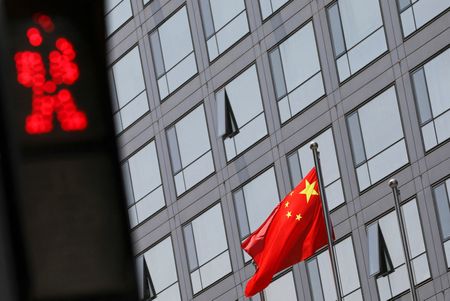SHANGHAI (Reuters) -China’s securities regulator issued draft rules on Friday to strengthen the supervision of company listings, delistings and computer-driven programme trading, in a move to improve the stock market and protect investors’ interests.
The China Securities Regulatory Commission (CSRC) will raise the bar for initial public offerings (IPOs), force unqualified companies to delist, and strengthen the oversight of high-frequency trading, according to draft rules put out for public opinion.
Chinese authorities are stepping up efforts to revive investor confidence in the world’s second-biggest stock market. The blue-chip index has rebounded from five-year lows hit in February but is still struggling to stand on its feet.
“We will orient toward value centred around people and protect investors, especially small investors, more effectively,” CSRC Chairman Wu Qing said in an article posted on the watchdog’s website.
“We will set up a comprehensive supervision system so as to regulate with ‘teeth and thorns'”, said Wu, who earned the nickname “broker butcher” during a previous regulatory stint.
To improve the quality of listed companies, the CSRC said it plans to moderately increase the listing requirements in terms of sales and net profit for companies seeking to float on the main board and tech-focused ChiNext.
The bar will also be raised for companies targeting Shanghai’s tech-focused STAR Market.
Meanwhile, regulators will boost the number of randomly selected onsite inspections to 20% of listing candidates, from 5% previously. The number of onsite inspections on underwriters will also be increased, the CSRC said.
PROGRAMME TRADING
The CSRC also proposed tighter scrutiny of programme trading and high-frequency trading to maintain market fairness.
The regulator already cracked down on data-driven quant funds early this year, saying some institutions command unfair advantage over retail investors. In February, Chinese bourses barred a quant fund manager from trading for three days, saying it had broken rules on orderly trading.
Programme trading, in which orders are automatically placed using computers, “must abide by the principle of fairness, and must not endanger the exchange system, or disturb market order,” CSRC said in draft rules on Friday.
The rules call for setting up a reporting system for programme trading, with high-frequency trading subject to higher disclosure requirements and higher fees.
Both domestic and foreign capital will be included in the transaction reporting system and be subject to the same transaction monitoring standards, the CSRC added.
(Reporting by Shanghai and Beijing Newsrooms; Editing by David Goodman, Susan Fenton and Hugh Lawson)

